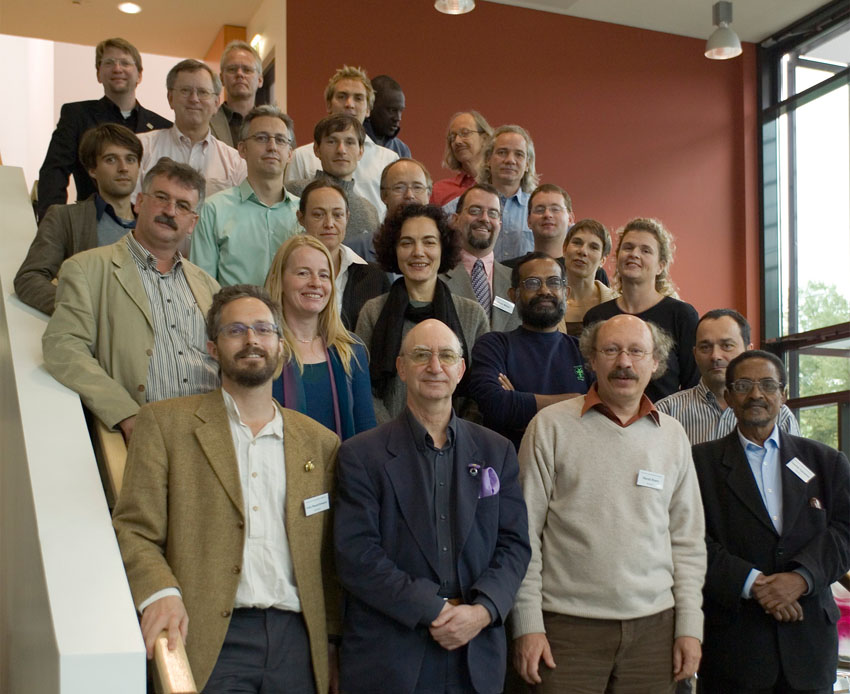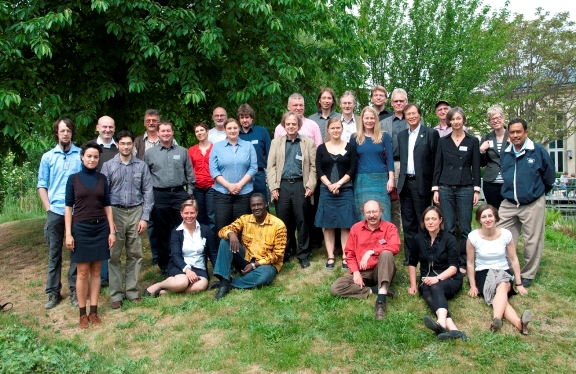The Expert Group's workshop series
Since 2006, the SPEG has arranged regular high-ranking international workshops on aspects of science-policy-interfacing that aim to
- bridge the gaps between different disciplines in science as well as science and practice, by
- providing a space for open discussions and exchange, following Chatham House rules, and thus
- aiming at supporting scientific as well as practical developments in the field by producing joint scientific papers as well as advice documents to specific science-policy processes.
Latest workshop
5th SPEG workshop, in cooperation with iDiv: “Five years of IPBES - reflecting the achievements and challenges and identifying needs for its review towards a 2nd work programme” (17th-19th of October 2017, co-funded via the iDiv flexpool)
IPBES, the Intergovernmental Science-Policy Platform on Biodiversity and Ecosystem Services is active now for about 5 years, conducting an ambitious work programme serving different functions and with diverse challenges for the governance of its processes. As part of the preparation for its second work programme, the last plenary of IPBES launched a review process to “evaluate the effectiveness of IPBES as a science-policy interface” (Decision IPBES/5/22).The workshop aims to bring together about 25 scholars researching on science-policy interfaces and experts involved in IPBES to
- discuss the current status of IPBES,
- get an overview about recent research on the emergence, processes and institutional arrangements of IPBES,
- identify potential needs for the ongoing IPBES review, and
- develop options so that scholars can further link their work on IPBES to inform the review process
The workshop is part of a two year project just started and funded via the iDiv flexpool scheme. iDiv is the DFG-funded German Centre for Integrative Biodiversity Research Halle-Jena-Leipzig. UFZ is a major partner of iDiv. The project aims at analysing the challenges that IPBES faces with respect to (1) the broad and inclusive participation of diverse scientific disciplines and other stakeholders in its activities and (2) the mutual exchange of knowledge between different IPBES activities, mainly with focus on the its Global Assessment.
The project, conducted jointly by Carsten Neßhöver, Isabel Díaz Reviriego, Silke Beck, Josef Settele (all UFZ, Science-Policy Expert Group), Henrique Pereira (iDiv) and Esther Turnhout (Univ. of Wageningen), has the goal to produce high-quality scientific outputs that could also inform the IPBES review process in the coming years.
Earlier workshops
1st workshop:
International Science-Policy-Interfaces for Biodiversity Governance – Needs, challenges, experiences. A contribution to the IMoSEB Consultative Process
Oktober 2006, supported by DG RTD, European Commission, and BfN
Final report

2nd workshop:
Nested Networks – taking stock of the development in international science-policy-interfacing and its governance
May 2011, funded by BMBF in the context of the NestNet project
Workshop background and outcomes
- Hulme, M., Mahoney, M., Beck, S., Görg, C., Hansjürgens, B., Hauck, J., Neßhöver, C., Paulsch, A., Vandewalle, M., Wittmer, H., Böschen, S., Bridgewater, P., Diaw, M.C., Fabre, P., Figueroa, A., Heong, K.L., Korn, H., Leemans, R., Lövbrand, E., Hamid, M.N., Monfreda, C., Pielke Jr., R., Settele, J., Winter, M., Vadrot, A.B.M., van den Hove, S. & van der Sluijs, J.P.(2011): Science-Policy Interface: Beyond Assessments. Science 333: 697-698

3rd workshop:
Nested Networks − Between wishful thinking, empirical evidence and practical relevance
May 2013, funded by BMBF in the context of the NestNet project
Workshop background and report
- Beck, S., Borie, M., Chilvers, J., Esguerra, A., Heubach, K., Hulme, M., Lidskog, R., Lövbrand, E., Marquard, E., Miller, C., Nadim, T., Neßhöver, C., Settele, J., Turnhout, E., Vasileiadou, E. & Görg, C. (2014): Towards a reflexive turn in the governance of global environmental expertise: the cases of the IPCC and the IPBES. GAIA 23 (2): 80-87 (online)
- Lövbrand, E., Beck, S., Chilvers, J., Forsyth, T., Hedrén, J., Hulme, M., Lidskog, R. & Vasileiadou, E. (2015): Who speaks for the future of Earth? How critical social science can extend the conversation on the Anthropocene. Global Environmental Change 32: 211-218 (online)
4th workshop:
4th SPEG workshop: “To be inclusive, you need more voices.” – Making sense(s) of “Co-Production” (May 2015, funded via UFZ)
The objective of this workshop is to take stock of the discussions on Co-Production. The idea that knowledge is co-produced, with scientific researchers and stakeholders actively involved, has been adopted now by Future Earth - Research for Global Sustainability initiative. In order to fill the gap between the supply of scientific findings and its demand at different levels of decision-making, co-production has become a key concept guiding major research initiatives in response to Grand Challenges such as climate change, biodiversity loss, food and energy supply.
This workshop explored the possible academic and practical value of co-production. Novel forms of knowledge production such as co-production or transdisciplinary science are assumed, often unproblematically, to advance the ‘usability’ of expertise, to improve science politics interactions and to democratize politics, yet do they do so?
